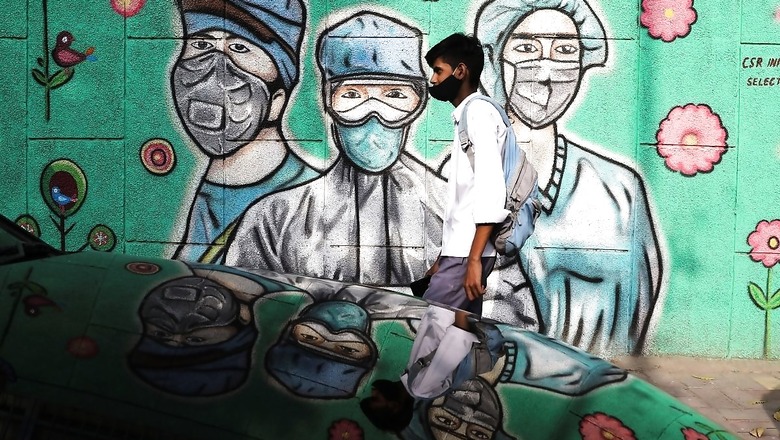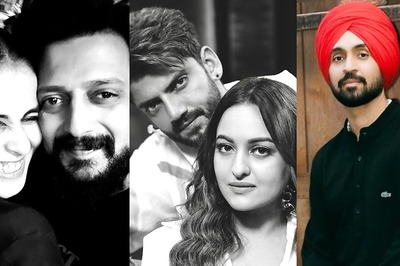
views
The Principal Scientific Advisor to Prime Minister, Prof K Vijayraghavan, said on Thursday the peak of the current coronavirus wave is likely to be towards the end of the month. In an interview, the professor said there are no variants of COVID-19 that are vaccine evasive and there is not one but several reasons behind the huge spread of the virus that is being witnessed at the moment.
#EXCLUSIVE | We are showing a large number of cases per day and that it a cause of worry: Prof K Vijayraghavan (@kvijayraghavan), Principal Scientific Advisor, GOI.Watch #NewsEpicentre with @maryashakil. pic.twitter.com/U12UIAE1ng
? News18 (@CNNnews18) April 22, 2021
India on Thursday recorded 3,14,835 new Covid-19 cases, the highest one day spike seen ever in the pandemic. The death toll in the last 24 hours stood at 2,104. On this, Prof Vijayraghavan said, ?We are indeed showing a large number of cases and that is cause of great concern, but keeping in mind peaks and falls together take about a period of 12 weeks and these periods need to be looked at in terms of states and districts. Overall it will take a little longer and we should start seeing falls towards the end of this month, early next month. Meanwhile, given the new variants here we need to take measures to address every aspect of healthcare now in terms of distancing, analysis of strains and largescale vaccination. Hence, focus should be on what we can do right now than what will happen.?
When asked about the oxygen crisis and emergency supplies being sought by COVID-crippled states like Maharashtra and Delhi, he said, ?We have learnt from the first wave that oxygen is effective. Earlier, we thought ventilators would be required for everyone, but with further studies we learnt those with relatively mild symptoms breathing deeply would help and those who have moderate to severe symptoms oxygen is very valuable and ventilators at a later stages of illness. That learning has resulted in the requirement of oxygen. While oxygen capacity has increased, the scale of what we see now has posed an enormous challenge and that has now led to rerouting of oxygen supplies from various other components in our system into medical oxygen on a largescale.?
Regarding the lack of planning to deal with second wave given the crisis witnessed in countries like the US and UK, he said the enormous increase in health infrastructure in terms of ICU beds had been diverted back to routine work and that is now being brought back. ?But we need to keep in mind the huge rise in cases and now push hard and meet the crisis. For example, the DRDO has set up a large hospital in a few days in Delhi, while another one is coming up in a few days. Several such hospitals are being built across the country. Such learnings of building hospitals so fast is coming very valuable, but even those hospitals are full now and we need more.?
Regarding the pricing of vaccines from May 1 with a controversy already raging over the states slamming the differential pricing strategy, the professor said the focus should be on expanding the vaccination programme. ?Fifty per cent of the vaccines manufactured in India that have been cleared from the drug laboratories for marketing will be available to the state governments and they can negotiate the prices. Also, state governments can reduce the price for their populations. Importantly, another 50 per cent is there in the national immunisation programme that is being given at no cost by the Centre to the states and it is not that these are going somewhere else. That is going to have a huge impact. Together, with the increase in manufacturing and the flexibility that states, we should see an increase in vaccination. Also, the new rules allow the import of vaccines which have been authorised for emergency use internationally. This means the states can buy 100 per cent of that import if they want to and at negotiable prices. All of these would only increase the availability of vaccines. We should not see predatory pricing and even if the price is high, states have multiple ways to reduce the same so that beneficiaries get it at little or no cost.?
Regarding the third mutant and if we are always one step behind the virus, Prof Vijayraghavan said calling the viruses single, double or triple mutant is not correct nomenclature. As the virus travels from person to person, city to city, country to country, it gets many new mutations, which are by and large date and time stamps ? where has the virus been. ?This doesn?t enhance or reduce the capability of the virus. Now, some mutations enhance the transmissibility or the vaccine evasiveness. If these mutations of interest are demonstrated in the laboratory and growing impact on the ground, then these variants become a concern. These variants of concern are examined rapidly ? whether they are vaccine evasive or not. So far, we do not have any variants of concern which are vaccine evasive. So we should just enhance the vaccination programme, stay far from each other, wear masks and prevent these variants to dominate.?
Speaking further on the massive spread, he said there are three components to it. First, a small fraction of those getting reinfected, secondly transmissible variants adding to the spread substantially while vaccination is complete yet and third is our behaviour that encourages transmission. All these are adding to the huge surge and there is no one particular reason behind it.
Read all the Latest News, Breaking News and Coronavirus News here. Follow us on Facebook, Twitter and Telegram.




















Comments
0 comment